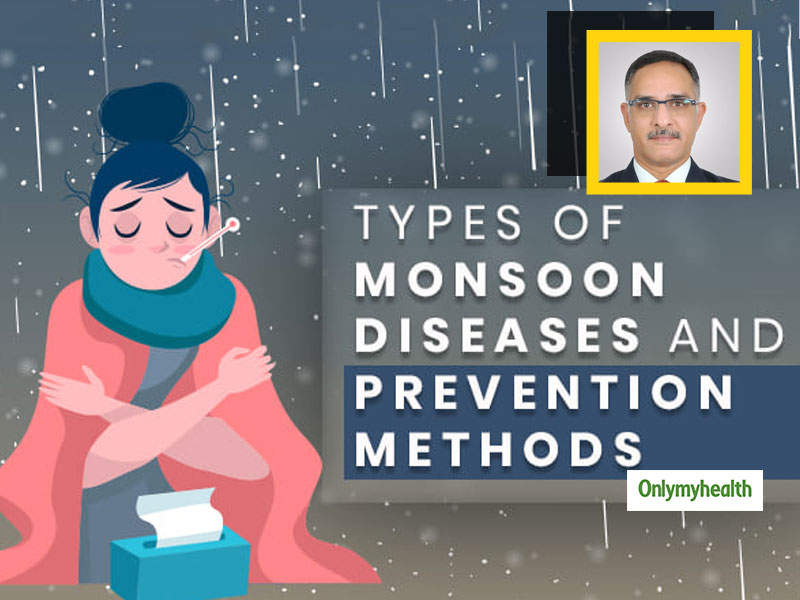
The rainy season has arrived. The more pleasant this season is, the higher the risk of infections during this time. We must know about them to avoid monsoon diseases. Preventive measures should also be adopted against monsoon diseases to be safe from any danger. The present time is more crucial for everyone is reeling under the threat of COVID-19, making it even more essential to take necessary actions and precautions to stay safe from monsoon diseases. No matter how much we love the rains, it is also a season of malaria, dengue, typhoid, fever, stomach infections and more. One must understand that even though these diseases are not severe and can be treated with home care and medication, it can also lead to weakened immunity, increasing the chances of other illnesses too. Some tips for boosting immunity:
Table of Content:-
Also Read: COVID-19 & Monsoon: Will This Season See A Shift In The Virus?
Dr Satish Kumar M G - Consultant Internal Medicine - Columbia Asia Hospital Mysore explains how unhygienic conditions and various other factors contribute to uninvited complications. Also, most of these remain undiagnosed, causing grave discomfort. The most crucial aspect here is to diagnose and treat monsoon-related illnesses timely. Before that, we need to know what the various monsoon illnesses and its essential characteristics for better understanding.
Water-Borne Diseases On A Rise During Monsoons
While the monsoon season gives relief from the scorching heat, on the other hand, rain increases the humidity in the air, causing bacteria and other pathogens to overgrow. In such weather, primarily due to stagnant water, the chances of infectious diseases spreading by water increases manifold. People often misuse anti-biotic medicines for the treatment of these waterborne diseases in India without doctor’s advice. Dr Kumar says that those with poor immunity are more prone to such diseases. Some common water-borne diseases that one can experience during this time are Hepatitis A or jaundice, stomach infections and more. Some common symptoms of the water-borne disease are:
- Weight loss
- Tiredness and fatigue
- Yellow colour tinge in eyes and skin
- Darker urine
- This primarily happens due to unclean surroundings, and food could be a major source too.
What Causes Typhoid?
Typhoid fever is a bacterial disease, in which the symptoms are seen in mild to the severe form. It appears one to three weeks after exposure to the bacteria. Some common symptoms of typhoid include headache, nausea, fever, constipation or diarrhoea, loss of appetite, and pink coloured rashes on the body. Dr Kumar adds that signs of typhoid fever are similar to symptoms of other common gastrointestinal diseases. The typhoid fever is communicable and can spread from one person to the other. It is spread via the estuary-mouth route. The World Health Organization (WHO) recommends two typhoid vaccines.
Humidity Cause Viral Infections
Diseases caused by viral infections include the common cold, heavy eye, dengue fever, meningitis, etc. What makes it easier for one to be more prone to viral infections during monsoon is the humidity. This makes it easier for the spread of the virus from an unwell person to another. Hence, it is essential to strengthening immunity to be safe from such infections. Watch this video for care tips for cold and flu:
Mosquito-Borne Illnesses
A small mosquito can bite us anytime, anywhere and make us seriously ill. With monsoon, it is common to have stagnant water puddles around the house. Those are breeding grounds for mosquitoes, which further lead to waterborne diseases like malaria and dengue. Malaria is a disease that spreads through the bite of female mosquito Anaphylis. These mosquitoes breed in dirty and contaminated water, and they bite in the daytime. Symptoms of malaria are dizziness, shortness of breath, fever etc. If this happens, contact a doctor and take special care of cleanliness during the rain. Dr Kumar adds how dengue can be diagnosed with lab tests. “Dengue is a disease that has killed many people, and even after cure, the patient can experience after-effects for several days, weeks and even months. In dengue, the patient may show symptoms like high fever, headache, pain behind the eyes, muscle and joint pain and pimples on the body.

Also Read: 4 Types of Viral Skin Infections And Their Characteristics For Timely Diagnosis And Treatment
Hence, the need of the hour is to take necessary precautions during this season to be safe from the diseases mentioned above. On a concluding note, Dr Kumar shares some essential care tips to be safe from monsoon diseases:
- Be careful of what you eat. Food and water are some essential agents which could be the start to water-borne diseases. Hence, there could be a risk for them being contamination. Cook fresh food, and do not store or refrigerate any dish for more than 2 days.
- Drink only boiled water in this season
- Wash your hands before you cook. Ensure that your kitchen is clean and also always wash hands after using the toilet.
- Wear proper footwear, full clothes while stepping out for essentials. Air your feet if you step in water.
- Do not go to any crowded place as it enhances the chances of viral disease spread.
- Do not touch your face without washing your hands.
In the end, make sure that you take timely help and proper medication if any of these symptoms arise. If not treated on time, all of these symptoms could be potentially fatal too!
Read more articles on Other Diseases
How we keep this article up to date:
We work with experts and keep a close eye on the latest in health and wellness. Whenever there is a new research or helpful information, we update our articles with accurate and useful advice.
Current Version
